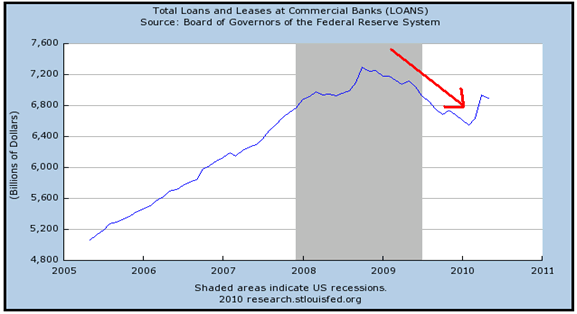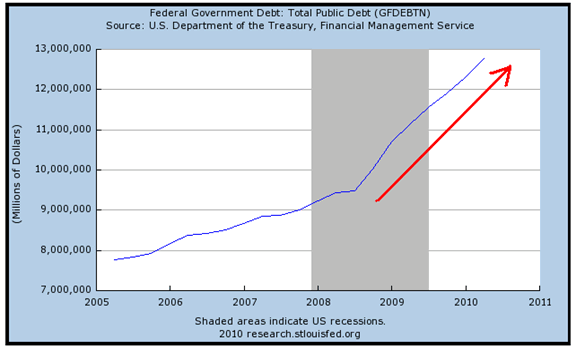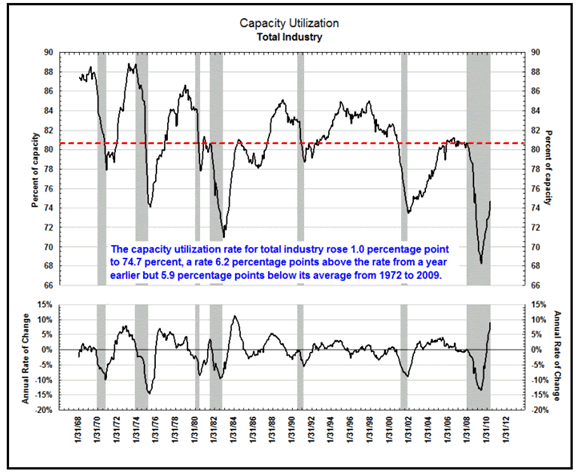Debunking the Mainstream Economists Deflation Myths
Economics / Deflation Aug 03, 2010 - 03:05 AM GMTBy: Puru_Saxena
 BIG PICTURE – Many prominent economists define deflation as a decline in the general price level within an economy. To make matters worse, these academics use the establishment’s highly manipulated inflation data as their yardstick. Therefore, when the heavily massaged Consumer Price Index (CPI) and Producer Price Index (PPI) show a moderate increase, these folks celebrate the ‘perfect scenario’ of moderate inflation and when the CPI and PPI contract, they worry about deflation. Unfortunately, the vast majority of people blindly follow the views of the mainstream economists. Consequently, they end up making costly mistakes with their capital.
BIG PICTURE – Many prominent economists define deflation as a decline in the general price level within an economy. To make matters worse, these academics use the establishment’s highly manipulated inflation data as their yardstick. Therefore, when the heavily massaged Consumer Price Index (CPI) and Producer Price Index (PPI) show a moderate increase, these folks celebrate the ‘perfect scenario’ of moderate inflation and when the CPI and PPI contract, they worry about deflation. Unfortunately, the vast majority of people blindly follow the views of the mainstream economists. Consequently, they end up making costly mistakes with their capital.
You will recall that during the bottom of the previous bear-market, most of the pundits were shunning ‘risky assets’ (stocks and commodities) and they were advocating a heavy exposure to cash and fixed income assets. Back then, the vast majority of strategists and their devotees were erroneously fretting about deflation. According to these folks, deflation was a done deal due to the following reasons:
a. Contraction in private-sector debt – When the credit crisis arrived in the summer of 2008 and asset prices collapsed later that year, over-leveraged consumers and businesses started paying off their debt (Figure 1). After all, this act of deleveraging was a logical reaction to the devastation caused by the most vicious bear-market since the 1930s. So, when private-sector debt began to shrink, the proponents of deflation (deflationists) announced the death of inflation. “How could the global economy inflate when the private-sector was tightening its belt?” was their battle cry.
Figure 1: Private-sector debt in the US

Source: St. Louis Fed
Although the deflationists had a point, their assessment was flawed because they totally ignored the borrowing capabilities of the governments. Whilst it is true that from peak to trough, private-sector debt in the US contracted by roughly US$800 billion, this debt reduction was overwhelmed by the US government’s debt accumulation efforts.
Figure 2 shows that over the past two years, US federal debt has surged by a whopping US$3 trillion, thereby more than offsetting the deflationary impact of private-sector deleveraging. If you have any doubts whatsoever, you will want to note that total debt in the US is now at a record high!
Figure 2: Explosion in US Federal Debt

Source: St. Louis Fed
It is interesting to observe that in response to the Great Recession, in addition to the US, most governments have taken on huge amounts of debt. And by doing so, they have managed to thwart the deflationary forces of private-sector debt repayment.
b. Excess capacity – The lack of aggregate demand and the excess capacity prevalent within the economy is another factor often cited by the deflationists. Let us explain:
You will recall that in the aftermath of the Lehman Brothers bust, the credit markets froze and the global economy came to a screeching halt. Suddenly, worldwide consumption contracted and the world was left with idle factories, empty buildings and unwanted inventories. Thus, the deflationists argued that with such a lack of aggregate demand and so much spare capacity, we could never experience inflation.
Once again, the deflationists failed to understand that over-capacity has been a constant feature in our economic landscape and price increases (which they erroneously describe as inflation) have very little to do with capacity utilisation.
It is interesting to observe that over the past 42 years, the US economy has never operated at full capacity (Figure 3). Moreover, it is notable that even during the highly inflationary 1970s and the most recent inflationary boom (2003-2007), the US economy operated well below maximum capacity. In case you are wondering, the same holds true for the global economy. Therefore, the idea that inflation cannot occur in the face of excess capacity is ill-conceived and absurd.
Figure 3: Chronic over-capacity in the US

Source: www.thechartstore.com
All the popular deflation myths aside, the reality is that inflation is an increase in the supply of money and debt within an economy. Furthermore, the price increases often described as inflation are simply consequences of monetary inflation (euphemism for the dilution of the money stock).
Look. Whenever any central bank creates new money and whenever any entity (individual, business or government) takes on more debt, the outcome is inflation. As Milton Friedman once said, “inflation is always and everywhere a monetary phenomenon”.
Today, under our fiat-money system, governments are willing borrowers and central banks are more than eager lenders (money creators). Under these circumstances, a contraction in the supply of money and debt (deflation) is out of the question. Conversely, given the short-sightedness of the politicians and their perpetual urge to ‘kick the can down the road’, the real risk facing the economy is extreme inflation or even hyperinflation.
Given our grim outlook on inflation, we continue to favour hard assets and the fast-growing developing economies in Asia. If our assessment is correct, our preferred sectors (energy, precious metals and industrials) and our favourite stock markets (China, India and Vietnam) are likely to generate spectacular long-term returns.
Puru Saxena publishes Money Matters, a monthly economic report, which highlights extraordinary investment opportunities in all major markets. In addition to the monthly report, subscribers also receive “Weekly Updates” covering the recent market action. Money Matters is available by subscription from www.purusaxena.com.
Puru Saxena
Website – www.purusaxena.com
Puru Saxena is the founder of Puru Saxena Wealth Management, his Hong Kong based firm which manages investment portfolios for individuals and corporate clients. He is a highly showcased investment manager and a regular guest on CNN, BBC World, CNBC, Bloomberg, NDTV and various radio programs.
Copyright © 2005-2010 Puru Saxena Limited. All rights reserved.
© 2005-2022 http://www.MarketOracle.co.uk - The Market Oracle is a FREE Daily Financial Markets Analysis & Forecasting online publication.



